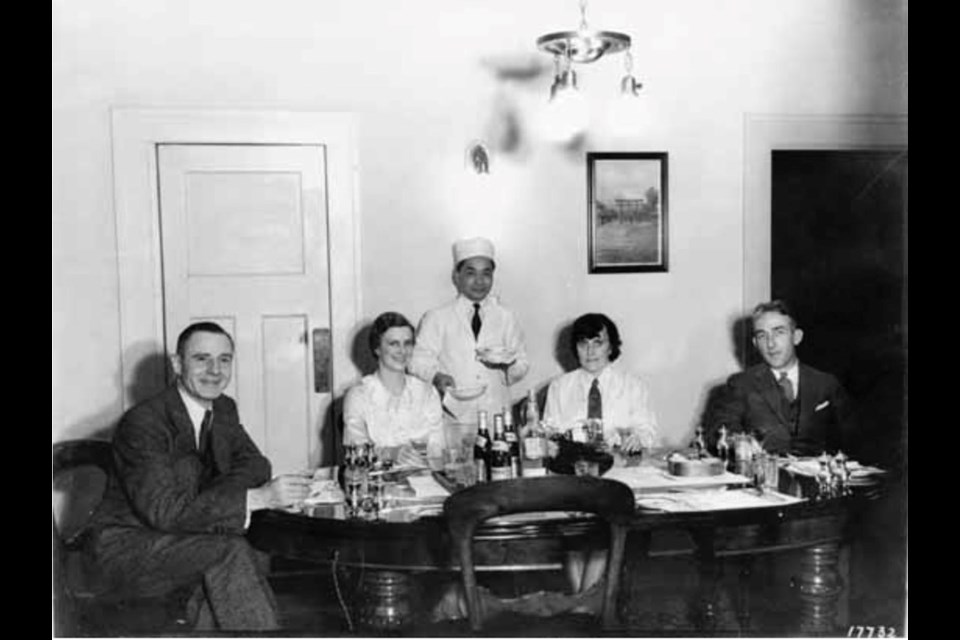The theme for Asian Heritage Month (May) in 2024 is Preserving the Past, Embracing the Future: Amplifying Asian Canadian Legacy.
Chinese immigrants began arriving in the qathet region in the 1880s, primarily employed in resource-based industries like logging and mining.
One early immigrant, Lee Sing, became a successful entrepreneur. In 1907, he established a laundry for Michigan Lumber Company employees who were logging around Powell Lake. A few years later, foreseeing the influx of labourers with the construction of the Powell River Company, Sing opened the first general store, restaurant and rooming house.
By 1923, Sing was pushed to the outskirts of the town by the Powell River Company, which encouraged employees to only support the company store. Undeterred, Sing and his family rebuilt their businesses at the current site of the Shinglemill Pub, eventually expanding into Wildwood with a truck and market garden. They operated Fairway Market (est. 1936) and Penny Profit (est. 1940), with Penny Profit remaining open until 1987.
This story is just a fragment of the broader history of a substantial Asian Canadian population in qathet, as evidenced by the 1921 and 1931 census data. Companies like the Pacific Lime Company on Texada Island and various lumber camps from Stillwater to Lund employed Asian Canadian labourers, often paying Chinese men half the wages of their white counterparts.
Segregated bunkhouses and the employment of Chinese servants by white households were common. Despite the absence of an official Chinatown, the contributions, heritage and stories of Chinese and Japanese communities in qathet remain significant, yet largely unacknowledged.
In early British Columbia, settlers were adamant about creating a “white man’s province.” The presence of Asian immigrants—Chinese, South Asians and Japanese—was perceived as economic competition. This fear persisted regardless of economic conditions and was rooted in the belief that Asians were biologically unassimilable and would threaten British racial purity. Numerous exclusionary groups emerged, advocating for provincial and federal legislation to bar Asian immigrants and labourers.
The Asiatic Exclusion League gained traction in the province, especially in 1921, travelling to recruit members and urge major industry employers to replace Asian labour with white labour. The qathet region was among the areas visited by the league.
Alexander Manson, the attorney general, supported these efforts, pushing for a “white British Columbia.” At one meeting in Vancouver, Manson even boasted about the Powell River Pulp and Paper mill replacing Asian-Canadian employees with white workers. Ten years later, the Powell River Company was still boasting about this, proudly claiming in a 1931 Vancouver Province article titled Mill Expansion: No Orientals:
“The Powell River Co., as the leading pulp and paper concern of the province, has been closely identified with British Columbia’s prosperity in the past 20 years. Today 90 per cent of the company employees are British subjects, and no Orientals appear on the company payroll. In all the recent construction periods, the policy of the company has been to purchase, whenever possible, goods and equipment of British Columbian and Canadian manufacture […] machinery incidental to the plant extension has been purchased on the same basis, and today by far the greater portion of the machinery and equipment in Powell River represents the labour of Canadian workmen and the genius of Canadian manufacturers.”
During those 10 years, several pieces of racialized legislation were enacted, including the Chinese Exclusion Act of 1923.
History is a living entity that informs our present. Sharing stories is vital. It is an act of cultural transmission that carries truth, teachings and inheritance. Every culture engages in this act.
Sharing difficult truths is not meant to induce guilt but to validate and acknowledge the diverse experiences that form the foundation of this community, province and nation. Acknowledgment precedes reckoning, and without it, we risk repeating past mistakes.
Kirsten Van’t Schip is a mother and researcher living in the territory of Tla’amin Nation.
Join the Peak's email list for the top headlines right in your inbox Monday to Friday.




